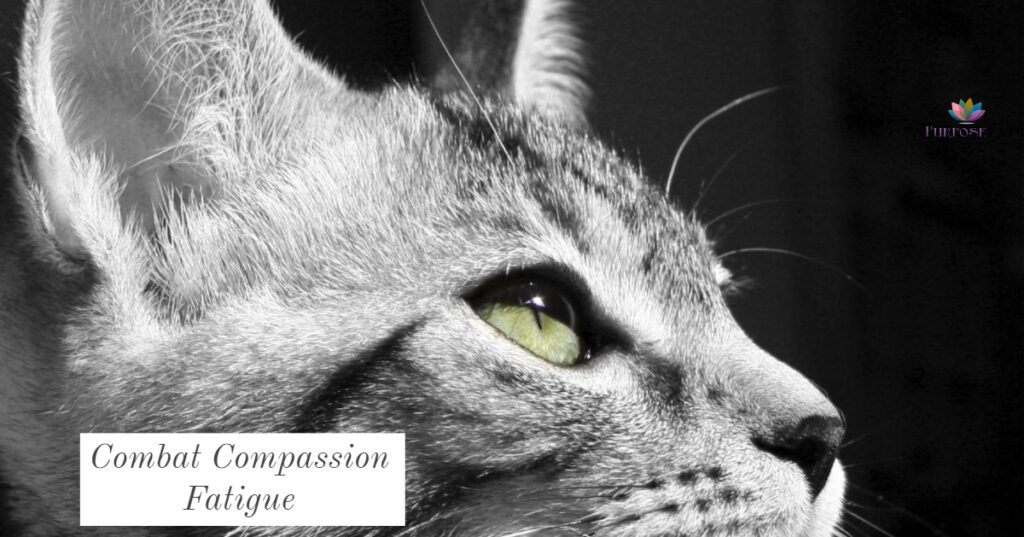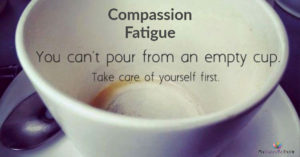I’ve been supporting animal welfare and care professionals for the past 15 years. Now, with Covid-19 and fires raging through California where I live, it’s time to support ALL CAREGIVERS.
Compassion Fatigue is huge in the veterinary and animal welfare communities. The continued wear and tear on our compassion and empathy seems never-ending!
So what IS compassion fatigue? It is NOT being tired! It’s about experiencing burn-out, experiencing vicarious trauma, and secondary trauma. Also called “vicarious traumatization” or secondary traumatization (Figley, 1995).
“Compassion fatigue is the emotional residue or strain of exposure to working with those suffering from the consequences of traumatic events. It differs from burn-out, but can co-exist. Compassion Fatigue can occur due to exposure on one case or can be due to a “cumulative” level of trauma.” (The American Institute of Stress)
Compassion is beautiful!! It fills our world with joy and purpose. Compassion is caring for others. Compassion helps us grow as a person. But when we are constantly confronted by situations that need our compassion, we begin to experience our own pain.
Signs of compassion fatigue can be depression, anger, anxiety, sadness, and more. But there are things you can do to deal with the stresses of an open heart.
I worked at an animal shelter for 5 years. It was the hardest job I ever had. Every day–another heartbreaking story.
Animals turned in because they were old and the family wanted a puppy or kitten, the family is moving, dogs falling out of trucks, owners who leave the dog chained in the yard its entire life, abused, starved and neglected animals, animals left behind after their person died.
The stories, of course, go on and on. The point is that these stories are continuous and people who work in shelters, veterinary hospitals, sanctuaries and rescues deal with these stories and these animals every single day. This wears on staff. They are passionate about their work, but there’s just so much help they can offer. And the heartbreak that they experience becomes what is known as Compassion Fatigue.
Compassion fatigue is a huge problem in the veterinary community. The Centers for Disease Control and Prevention released the first study to ever examine veterinarian mortality rates in America. The results were grim: the suicide rate among veterinarians is between 2 to 3.5 times higher than the national average.
The animal welfare community (sanctuaries, rescue groups, shelters) represent another area of concern. The stress of animal work can affect morale and how they view their job.
Psychotherapist J. Eric Gentry tells the Sacramento Bee:
“Animal care professionals are some of the most pain-saturated people I have ever worked with. The very thing that makes them great at their work, their empathy and dedication and love for animals, makes them vulnerable.”
Signs of compassion fatigue can include:
- Depression
- Sudden outbursts of anger
- Feeling cynical or numb to what’s happening around you
- Feeling isolated from family and friends
- Exhaustion
- Difficulty sleeping just to name a few.
There are things that can help though. Dr. James Fogarty, an expert in critical incident stress management and trauma debriefing, states you must do 4 things:
- Talk about your experiences in enough detail to connect emotionally with them again.
- Acknowledge and safely express your feelings to someone you trust. Find a colleague you trust and use the 5-Minute Sharing to debrief (five-minute vent to take the lid off, cool it down—read Petfinder “what to do about compassion fatigue).
- Brainstorm and find solutions that let you take action
- Take care of yourself. Breathe
Learning mindfulness is proving extremely useful for people who suffer from compassion fatigue. Mindfulness increases empathy and serenity among animal care givers. Mindfulness emphasizes staying in the present moment, being non-judgmental, and striving toward an attitude of acceptance. Meditation is the method of creating this.
Research abounds on the benefits of mindfulness with:
- Improvement in depression, anxiety and coping skills
- Significant decrease in stress.
- Improved self-compassion, serenity and empathy
Journaling:
I highly recommend JOURNALING POWER: How to Create the Happy, Healthy Life You Want to Live by Mari McCarthy. Mari proves that building a regular journaling practice leads to tangible rewards in all aspects of your life. Her books offer you prompts to help you discover yourself. Release stress, emotional build-up and baggage that holds you back. Overcome challenges, changes and hardships. Heal wounds, relationships and illnesses. And get insight into what you want and who you are.
Spending time in nature:
Forest bathing is spending time in the forest exploring. Nope, you don’t jump in the stream. It refers to bathing your senses in all there is to explore in the forest–what you see, hear, smell, touch, taste. The trees emit a substance (essential oil) called phytoncide that are produced by trees to protect them from insects and germs. These oils are also hugely helpful to our bodies and even help increase our ‘killer cells’ that fight off cancer. There’s a lot of mindfulness in forest bathing too. Read my post “Heal in the Splendor of Nature.”
Learn EFT Tapping for anxiety relief:
This simple method of tapping on certain points on our body can be remarkably affective for dealing with stress!
Come join me to learn how to rediscover the joy and passion you once had!
The Compassion Fatigue Workshop is ready for your office and staff. Contact me to learn more or to create a program specifically for your group.
JOIN MY FACEBOOK GROUP
This group is about like-minded people in the animal community and other areas of caregiving. I share tips and more! Click and request to join.


